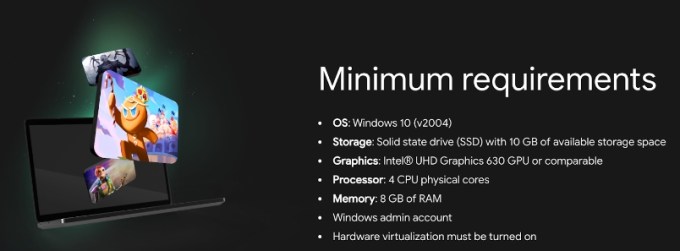Google is expanding its Google Play for PC program to eight more countries including the U.S., Canada, Mexico, Brazil, Indonesia, Philippines, Malaysia and Singapore in open beta. That means all players in these regions with Windows systems that meet the minimum requirements can access Google Play on a desktop computer.
The company first launched the program under a limit test in South Korea, Hong Kong, Taiwan, Thailand and Australia. Later in August, it expanded it to all players in these countries in open beta.
Google added that in the last couple of months it has added popular titles like “1945 Air Force,” “Blade Idle,” “Cookie Run: Kingdom,” and “Evony: The King’s Return” to the program with more games to be added soon.
In August, Google also restructured the minimum requirements for systems that can run Google Play for PC. Originally, Google required an eight-core CPU, a “gaming-class GPU” and 20GB of available storage space. With the reduced requirements, users need a four-core CPU, an integrated GPU and 10GB of free storage on the system.

Minimum system requirements for running Google Play Games on Windows Image Credits: Google
“We’re thrilled to expand our platform to more markets for players to enjoy their favorite games on Google Play. As we move towards a full release, we will continue to add new features and evaluate developer and player feedback,” Arjun Dayal, Director, of Google Play Games said in a blog post.
With this program, Google has made it possible for players can use their mouse and keyboard for inputs. Notably, it also started testing support for these inputs for Android games on ChromeOS in September.
In a separate project, Microsoft has been working with Amazon to bring Android apps to Windows 11. In August, the company expanded this preview feature to users based in Japan.
On the other hand, despite announcing the shutdown of its Stadia cloud gaming service, Google is still concentrating on bringing gaming to more players. In October, it introduced new Chromebooks tuned for cloud gaming with hardware makers like Acer, Asus and Lenovo.
Google Play Games for PC program expands to the US and seven other countries by Ivan Mehta originally published on TechCrunch















 English (US) ·
English (US) ·